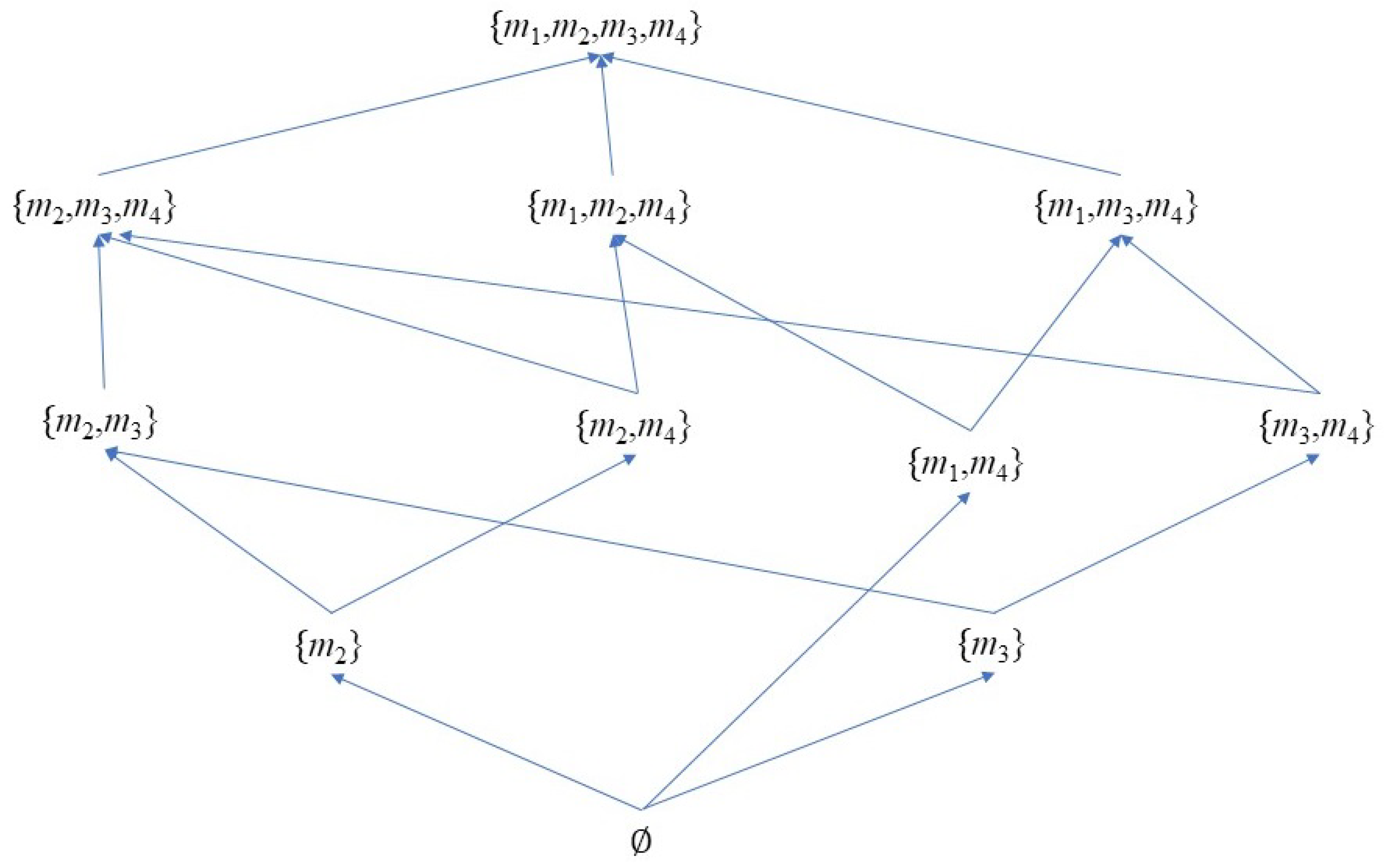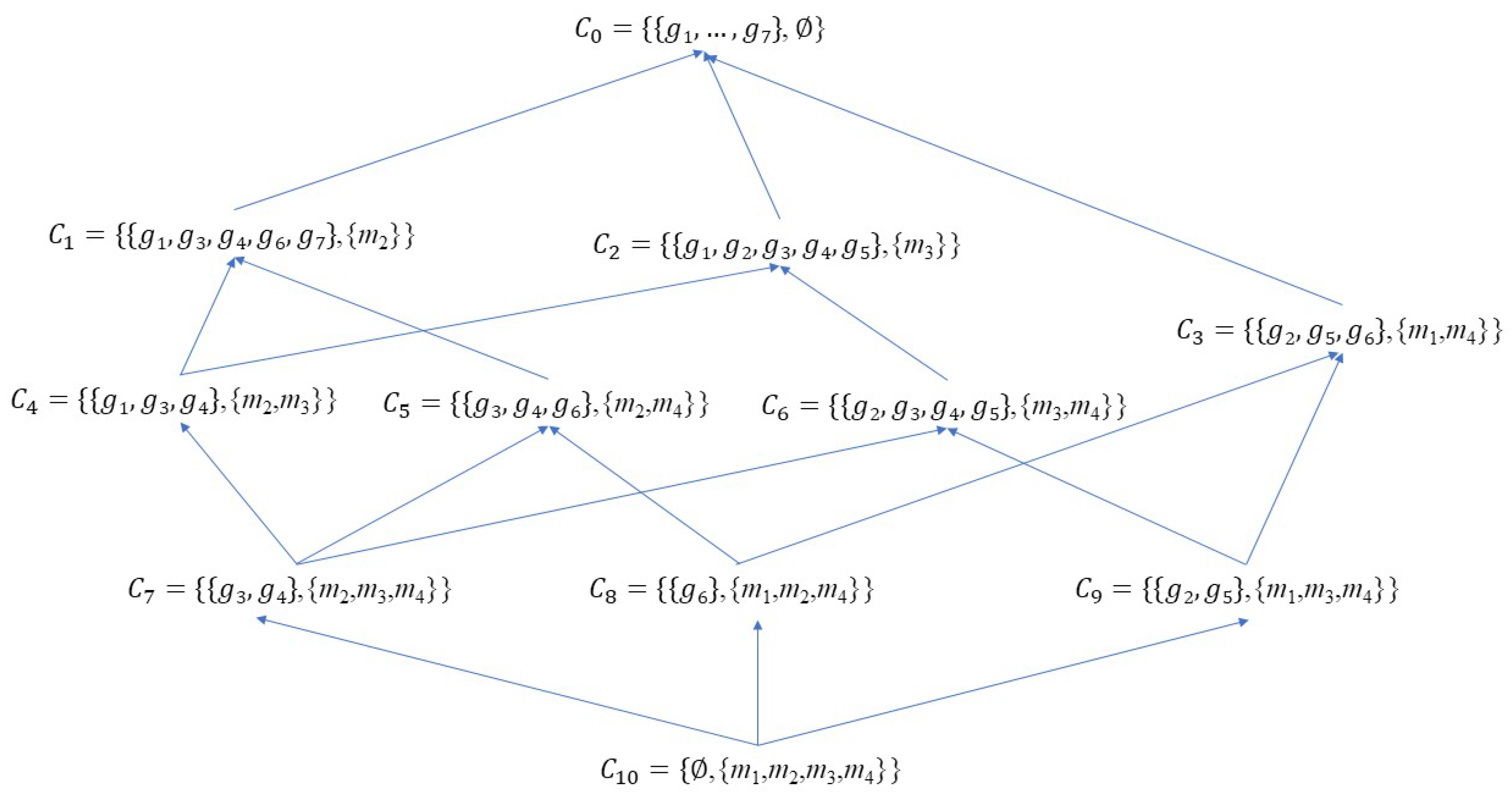Submitted:
13 September 2023
Posted:
13 September 2023
You are already at the latest version
Abstract
Keywords:
1. Introduction
2. Preliminaries
2.1. Preorders, partial orders and equivalence relations
2.2. Lattices
2.3. Formal concept analysis
- (1)
- For each , is the smallest extent containing X.
- (2)
- For each and ,
2.4. Rough set theory
- U is a finite set, called the universe,
- A is a finite set of attributes,
- for each , is the domain of values for i, and
- for each , is a total function.
3. Ordered Sets from Formal Contexts
3.1. Characterization about the finiteness of concept lattices
- (1)
- is a finite lattice.
- (2)
- The set of object intents is a finite set.
- (3)
- is a finite set.
- (4)
- The set of attribute extents is a finite set.
- (5)
- is a finite set.
3.2. Join-irreducibles and meet-irreducibles of finite concept lattices
- (1)
- is a lattice isomorphic to the concept lattice .
- (2)
- is a lattice dual isomorphic to the concept lattice .
- (3)
- The posets and are dual isomorphic.
- (4)
- The posets and are isomorphic.
- It has the bottom element of as its lower cover.
- It is an object concept whose intent is covered by M in the lattice .
-
It is an object concept whose intent is a maximal element within the poset.
-
It is an object concept whose intent is covered by M within the poset.
- (1)
- It has the top element of as its upper cover.
- (2)
-
It is an attribute concept whose extent is covered by G within the lattice.
- (3)
-
It is an attribute concept whose extent is a maximal element within the poset.
- (4)
-
It is an attribute concept whose extent is covered by G within the poset.
3.3. Rough conceptual approximations
-
the lower and upper conceptual approximationsare respectively toplogical interior and closure operators on
- the set is an Alexandroff topology on
- for each , is the smallest open neighborhood of g in the Alexandroff space .
4. Examples and Applications
4.1. Illustrative examples
- the elements covered by M in the lattice .
- the maximal elements of the poset .
- the elements covered by M within the poset .
- and are the lower covers of .
- and are the lower covers of .
- and are the lower covers of .
- has as its only lower cover.
- and are the lower covers of .
- and are the lower covers of .
4.2. Applications
- Personalized Product Recommendations: AI algorithms can utilize collaborative filtering or content-based recommendation techniques to identify products or services that are likely to appeal to a customer segment. By providing personalized recommendations based on their shared attributes, businesses can enhance the customer experience and increase conversion rates.
- Churn Prediction and Retention: Leveraging machine learning algorithms, businesses can analyze historical data of different segments and predict which groups of customers are at a higher risk of churn (i.e., discontinuing their association with the business). By proactively identifying these customers, companies can take targeted retention measures such as offering discounts, loyalty rewards, or personalized incentives to prevent churn.
- Cross-Selling and Upselling Opportunities: AI-based recommender systems can analyze the purchase history and behavior of a customer segment to identify potential cross-selling or upselling opportunities. By suggesting complementary products or premium upgrades based on their shared attributes, businesses can increase their average order value and revenue.
- Customer Segmentation: Using clustering algorithms such as k-means or hierarchical clustering, businesses can group customers into distinct segments based on their shared attributes. The segments derived from the formal context can serve as initial cluster assignments. AI algorithms can then refine these segments and uncover hidden patterns or subgroups within each segment. This kind of information can be used to develop targeted marketing campaigns tailored to the specific needs and preferences of each customer segment.
5. Conclusion
Author Contributions
Funding
Data Availability Statement
Conflicts of Interest
References
- Wille, R. Restructuring lattice theory. In Ordered Sets; Rival, I., Ed.; Reidel, 1982; Volume 83, pp. 445–470. [Google Scholar]
- Pawlak, Z. Rough sets. International Journal of Computer and Information Science. 1982; 11: 341-356. [CrossRef]
- Ganter, B. , Wille R. Formal Concept Analysis: Mathematical Foundations. Springer-Verlag, 1999.
- Shen, L. , Zhang, D. The concept lattice functors. International Journal of Approximate Reasoning. 2013; 54(1): 166-183. [CrossRef]
- Arenas, F.G. Alexandroff spaces. Acta Mathematica Universitatis Comenianae. 1999; 68: 68 17-25.
- Yamaguchi, D. , Murata, A., Li, G.D., Nagai, M. Rough Set Approximations in Formal Concept Analysis, in: Peters J.F. et al. (Eds.) Transactions on Rough Sets XII. Lecture Notes in Computer Science, vol 6190. Springer, Berlin, Heidelberg, 2010, pp. 226-235.
- Kent, R.E. Rough concept analysis: a synthesis of rough sets and formal concept analysis. Fundamenta Informaticae. 1996; 27: 169-181.
- Saquer, J. , Deogun, J.S. Formal rough concept analysis, in: Proceedings of the International Workshop on Rough Sets, Fuzzy Sets, Data Mining, and Granular-Soft Computing, 1999, pp. 91-99.
- Norris, E. An algorithm for computing the maximal rectangles in a binary relation. Revue Roumaine des Mathematiques Pures et Appliquees. 1978; 23: 476-481.
- May, J.P. Finite topological spaces. Notes for REU (2008). Available at http://www.math.uchicago.edu/ may/MISC/FiniteSpaces.pdf.
- Hein, James L. Discrete Mathematics. 2nd Edition, Jones and Bartlett Publishers, Inc., 2003.
- Hu, K. , Sui, Y., Lu, Y. Wang, J., Shi, C. Concept approximation in concept lattice, in: Hu K. et al. (Eds.) Advances in Knowledge Discovery and Data Mining. PAKDD 2001. Lecture Notes in Computer Science, vol 2035. Springer, Berlin, Heidelberg, 2001, pp. 167-173.
- Lin, T.Y. Granular computing on binary relations I: data mining and neighborhood systems, in: Skowron A., Polkowski L. (Eds.) Rough Sets and Knowledge Discovery, Physica -Verlag, 1998, 107-121.
- Banu, J. F. , Neelakandan, S., Geetha, B. T., Selvalakshmi, V., Umadevi, A., and Martinson, E. O., Artificial Intelligence Based Customer- Churn Prediction Model for Business Markets, Comput Intell Neurosci, 2022. [CrossRef]
- Davenport, T. , Guha, A., Grewal, D., Bressgott, T., How artificial intelligence will change the future of marketing, Journal of Academy of Marketing Science, 2020; 48:24-42. [CrossRef]
- Habil, S. , El-Deeb, S., and El-Bassiouny, N., AI-Based Recommendation Systems: The Ultimate Solution for Market Prediction and Targeting, The Palgrave Handbook of Interactive Marketing, C. L. Wang (ed.), 683-704.
- Murray, P. W. , Agard, B., Barajas, M. A., Market segmentation through data mining: A method to extract behaviors from a noisy data set, Computers & Industrial Engineering, 2017: 109: 233-252.
- Suh, Y. , Machine learning based customer churn prediction in home appliance rental business, J Big Data. 2023; 10(1): 41. [CrossRef]
- Babin, M.A. , Kuznetsov, S.O. Dualization in lattices given by ordered sets of irreducubles. Theoretical Computer Science. 2017; 658: 316 -326. [CrossRef]
- Birkhoff, G. Lattice Theory. American Mathematical Society, Providence, 3rd edition, 1967.
- Day, M.M. Convergence, closure, and neighborhoods, Duke Mathematical Journal. 1944; 11:181-199.
- Ganter, B. , Obiedkov, S. Conceptual Exploration. Springer-Verlag, Berlin Heidelberg, 2016.
- Kent, R.E. Rough Concept Analysis. CoRR abs/1810.06986 (2018).
- Markowsky, G. The Factorization and Representation of Lattices. Transactions of the American Mathematical Society. 1975; 203: 185-200.
- Pawlak, Z. Rough sets: theoretical aspects of reasoning about data, Dordrecht: Kluwer Academic Publishers, 1991.
- Pawlak, Z. Reasoning about data - a rough set perspective, in: Polkowski L., Skowron A. (Eds.) Rough Sets and Current Trends in Computing. RSCTC 1998. Lecture Notes in Computer Science, vol 1424. Springer, Berlin, Heidelberg, 1998, pp. 25-34.
- Priss, U. Formal concept analysis in information science. Annual Review of Information Science and Technology. 2006; 40(1): 521-543.
| 1 | In this paper, we use to denote the powerset of a set X. |
| 2 | A complete lattice is a partially ordered set in which every subset has an infimum and a supremum. |
| 3 | A closure operator on a set U is a function from the power set of U into itself which is extensive, isotonic (order-preserving) and idempotent. |


| I | ||||
|---|---|---|---|---|
| 0 | 1 | 1 | 0 | |
| 1 | 0 | 1 | 1 | |
| 0 | 1 | 1 | 1 | |
| 0 | 1 | 1 | 1 | |
| 1 | 0 | 1 | 1 | |
| 1 | 1 | 0 | 1 | |
| 0 | 1 | 0 | 0 |
Disclaimer/Publisher’s Note: The statements, opinions and data contained in all publications are solely those of the individual author(s) and contributor(s) and not of MDPI and/or the editor(s). MDPI and/or the editor(s) disclaim responsibility for any injury to people or property resulting from any ideas, methods, instructions or products referred to in the content. |
© 2023 by the authors. Licensee MDPI, Basel, Switzerland. This article is an open access article distributed under the terms and conditions of the Creative Commons Attribution (CC BY) license (http://creativecommons.org/licenses/by/4.0/).





